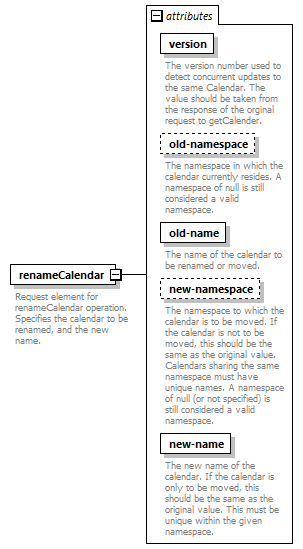| diagram |  |
||||||||||||||||||||||||||||||||||||||||||||||
| namespace | http://workcal.api.dac.n2.tibco.com | ||||||||||||||||||||||||||||||||||||||||||||||
| properties |
|
||||||||||||||||||||||||||||||||||||||||||||||
| attributes |
|
||||||||||||||||||||||||||||||||||||||||||||||
| annotation |
|
||||||||||||||||||||||||||||||||||||||||||||||
| source | <xs:element name="renameCalendar"> <xs:annotation> <xs:documentation>Request element for renameCalendar operation. Specifies the calendar to be renamed, and the new name.</xs:documentation> </xs:annotation> <xs:complexType> <xs:attribute name="version" type="dac:XmlLockVersion" use="required"> <xs:annotation> <xs:documentation>The version number used to detect concurrent updates to the same Calendar. The value should be taken from the response of the orginal request to getCalender.</xs:documentation> </xs:annotation> </xs:attribute> <xs:attribute name="old-namespace" type="xs:string" use="optional"> <xs:annotation> <xs:documentation>The namespace in which the calendar currently resides. A namespace of null is still considered a valid namespace.</xs:documentation> </xs:annotation> </xs:attribute> <xs:attribute name="old-name" type="xs:string" use="required"> <xs:annotation> <xs:documentation>The name of the calendar to be renamed or moved.</xs:documentation> </xs:annotation> </xs:attribute> <xs:attribute name="new-namespace" type="xs:string" use="optional"> <xs:annotation> <xs:documentation>The namespace to which the calendar is to be moved. If the calendar is not to be moved, this should be the same as the original value. Calendars sharing the same namespace must have unique names. A namespace of null (or not specified) is still considered a valid namespace.</xs:documentation> </xs:annotation> </xs:attribute> <xs:attribute name="new-name" type="xs:string" use="required"> <xs:annotation> <xs:documentation>The new name of the calendar. If the calendar is only to be moved, this should be the same as the original value. This must be unique within the given namespace.</xs:documentation> </xs:annotation> </xs:attribute> </xs:complexType> </xs:element> |
attribute renameCalendar/@version
| type | XmlLockVersion | ||
| properties |
|
||
| annotation |
|
||
| source | <xs:attribute name="version" type="dac:XmlLockVersion" use="required"> <xs:annotation> <xs:documentation>The version number used to detect concurrent updates to the same Calendar. The value should be taken from the response of the orginal request to getCalender.</xs:documentation> </xs:annotation> </xs:attribute> |
attribute renameCalendar/@old-namespace
| type | xs:string | ||
| properties |
|
||
| annotation |
|
||
| source | <xs:attribute name="old-namespace" type="xs:string" use="optional"> <xs:annotation> <xs:documentation>The namespace in which the calendar currently resides. A namespace of null is still considered a valid namespace.</xs:documentation> </xs:annotation> </xs:attribute> |
attribute renameCalendar/@old-name
| type | xs:string | ||
| properties |
|
||
| annotation |
|
||
| source | <xs:attribute name="old-name" type="xs:string" use="required"> <xs:annotation> <xs:documentation>The name of the calendar to be renamed or moved.</xs:documentation> </xs:annotation> </xs:attribute> |
attribute renameCalendar/@new-namespace
| type | xs:string | ||
| properties |
|
||
| annotation |
|
||
| source | <xs:attribute name="new-namespace" type="xs:string" use="optional"> <xs:annotation> <xs:documentation>The namespace to which the calendar is to be moved. If the calendar is not to be moved, this should be the same as the original value. Calendars sharing the same namespace must have unique names. A namespace of null (or not specified) is still considered a valid namespace.</xs:documentation> </xs:annotation> </xs:attribute> |
attribute renameCalendar/@new-name
| type | xs:string | ||
| properties |
|
||
| annotation |
|
||
| source | <xs:attribute name="new-name" type="xs:string" use="required"> <xs:annotation> <xs:documentation>The new name of the calendar. If the calendar is only to be moved, this should be the same as the original value. This must be unique within the given namespace.</xs:documentation> </xs:annotation> </xs:attribute> |
XML Schema documentation generated by XMLSpy Schema Editor http://www.altova.com/xmlspy